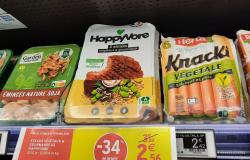
October 4, 2024 | Updated October 4, 2024
Saturday September 28, a mobilization against a project to expand a GSM Granulat sand quarry and the extension of industrial market gardening, brought together half a thousand people in the south of Nantes. Symbolic actions took place against the massive exploitation of natural resources.
Fifty billion tonnes of sand are extracted around the world each year, the equivalent of 18 kg per inhabitant per day, or nine times more than oil production, according to the United Nations Environment Program which warns of its overexploitation. If this exhaustible and increasingly rare resource is so coveted, it is because it is inexpensive and above all very useful for construction, cosmetics, paints, new technologies as well as industrial market gardening. According to official sources, France consumes around 353 million tonnes per year.
In the name of economic and demographic growth, many elected officials and businesses strongly defend sand mining, while increasingly, environmental agencies and environmental activists are sounding the alarm. Because its extraction and use cause a lot of damage to the environment and biodiversity. Extracted from quarries, beaches, rivers or seabeds, the sand trade causes pollution and drying of groundwater, destruction of natural spaces, greenhouse gas emissions, road traffic, artificialization of soils, etc.
Too many projects…
According to the newspaper Médiacité in 2021, Loire-Atlantique was one of the main producers in France. A number of projects for opening, reopening, creating or extending careers are currently under study. Projects against which a collective of associations, Stop career 44, is actively campaigning. The association, La tête dans le sable (LTDS), based in Saint-Colomban south of Nantes is one of them. Its members have been fighting since 2019 against the extensions desired by two sand giants, the cement manufacturers GSM Granulat and Lafarge Holcim, who have been exploiting the soil of this rural commune of 3,500 inhabitants for 20 years, at a rate of 400,000 tonnes of sand each each year. year.
This year, LTDS won a first victory since environmental requirements officially forced Lafarge to fold. But the GSM project, supported by the existing municipality and certain local elected officials, is still in the running. The quarryman whose operating rights are expiring, wishes to renew his rights for 20 years and extend over 30 ha of agricultural land. Areas previously protected by the territorial coherence plan, but whose requirements have been reduced by local elected officials. While the results of a Hydrology, Environment, Uses and Climate study will not be known until 2025, a public inquiry into a modification of the local town planning plan and into the impact study of the project has opened. this month.
Civil Disobedience Day
Especially since in Saint-Colomban, it’s a double penalty. Carriers and industrial market gardeners move forward hand in hand. 30% of the sand, coveted in particular for its draining qualities, goes to market gardeners. Also, after a mobilization against the grabbing of land, water, capital, with national repercussions in 2023, a new day of civil disobedience, co-organized with the Earth Uprisings, brought together 16 tractors and several hundred people , this Saturday, September 28. A day under close surveillance since the prefect had dispatched a helicopter, three drones and at least one squadron of CRS.
“Productions that meet our needs and not the needs of shareholders” Ronan Lherbier, CGT union delegate
Like the Scientists in Rebellion and the peasants, the local union of the CGT Sud Loire, present last April at the bedside of the seasonal workers of the exploited lily of the valley, responded to this call. “ We are against those who exploit resources and workers [mais] alongside those who want a radical transformation of our societies and production that meets our needs and not the needs of shareholders “, proclaimed Ronan Lherbier, CGT union delegate. Ditto for the farmers who are rebelling against these hectares of nourishing land left bare by the quarrymen and transformed into seas of plastic by “ a monoculture intended for export “. Everyone denounces “ ecological nonsense » and demand a more sober model. This is the case of Guillaume Planche, a farmer, who says he wants “ feed the inhabitants with the capabilities of the territory. For this we need mixed crops and livestock ».
Alternatives exist
In a festive atmosphere, the procession headed towards the GSM quarry, armed with shovels and buckets. The demonstrators loaded four trailers of sand stored in a market garden, which they then placed in front of the GSM gates. “ Return to sender “, chanted the activists. Then using meters of plastic sheeting and irrigation pipes “that the market gardener buries and crushes in a field, after use », deplores Martin Boileau, farmer, they locked up the impressive police force stationed in the quarry. Faced with too many CRS, a second symbolic action against extractivism will ultimately have been aborted. Activists are convinced that alternatives exist. “ But if we don’t cut off their sand tap, they will never try to produce and build differently. » The prefect of Loire-Atlantique must decide on the request from the GSM company before the end of the year.





